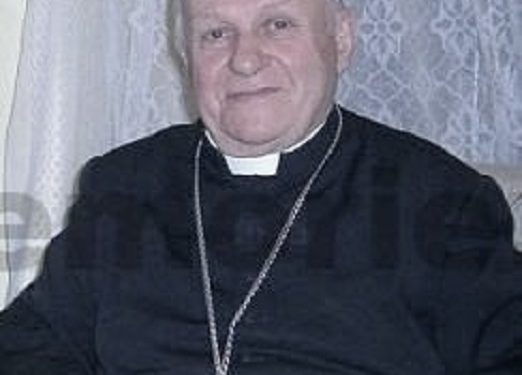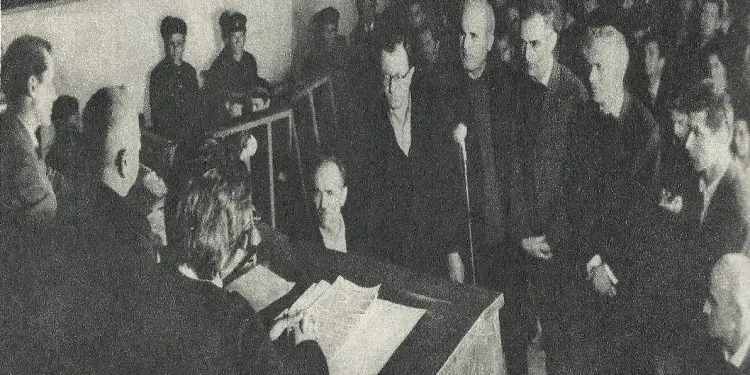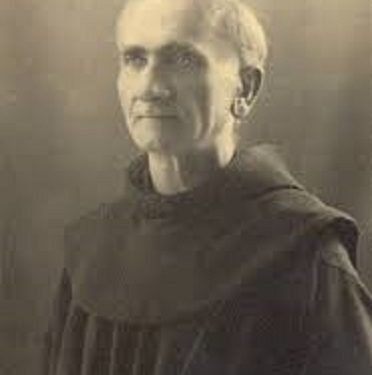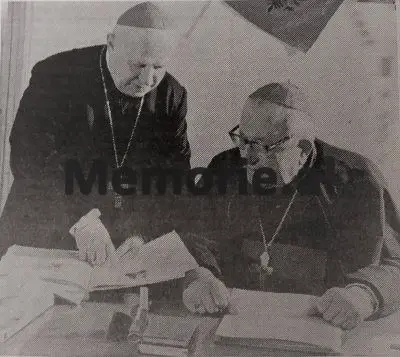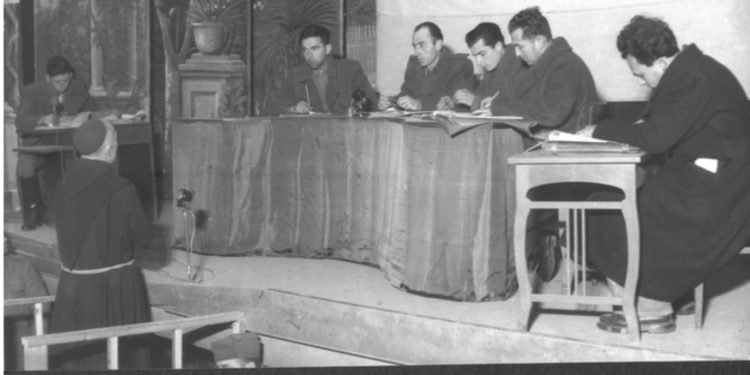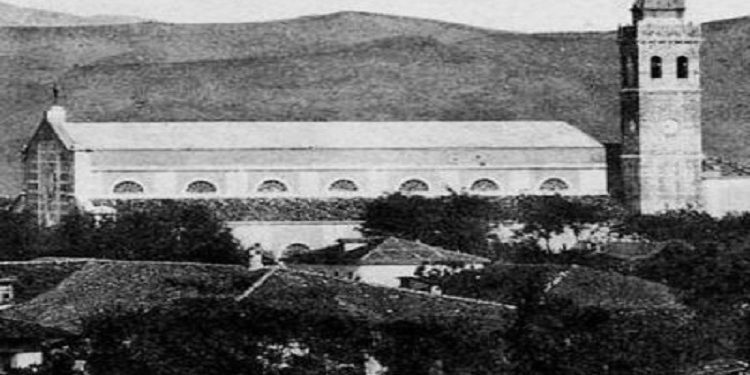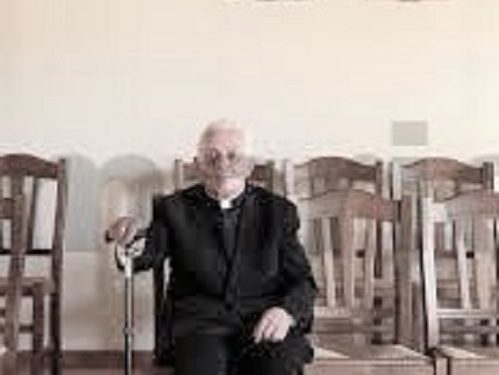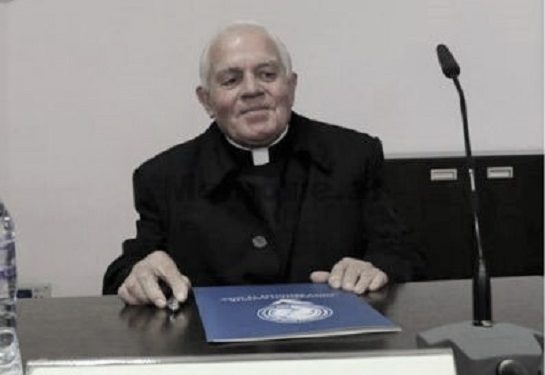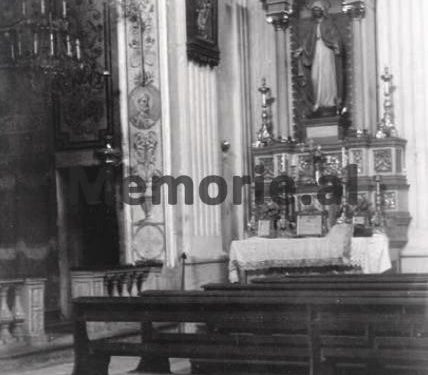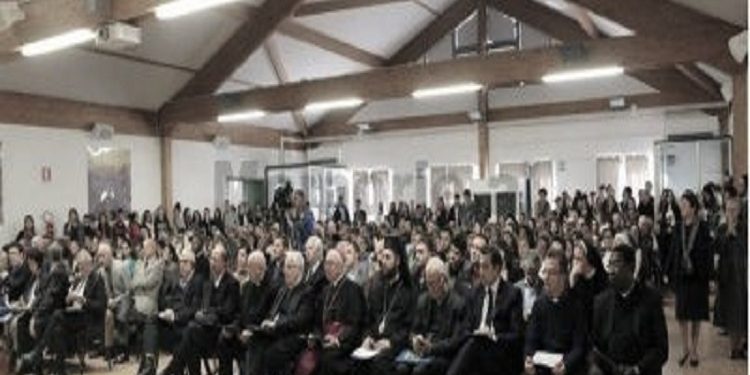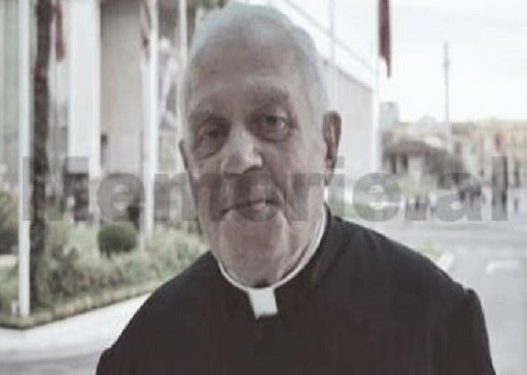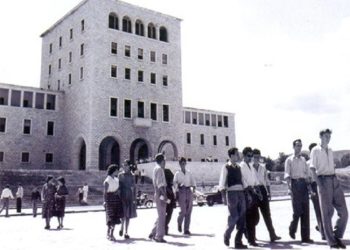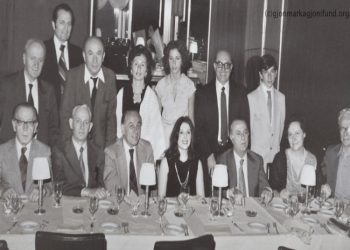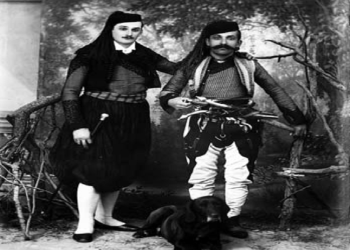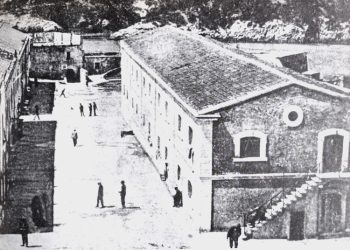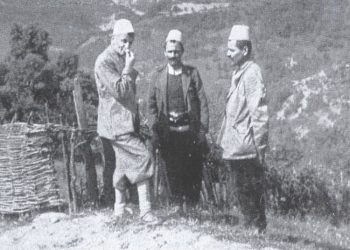Dashnor Kaloci
Memorie.al /publishes the testimony of Dom Gjergj Simoni, parish priest of the Buna Coast, who in 1967, when the communist regime started the war against religion, hid in his house ten bags of relics and books of the Archbishopric of Shkodra…
At the beginning of 1967, when the communist regime of Enver Hoxha launched a campaign to close churches and mosques and demolish places of worship, I spoke with my brother, Zef Simoni, who at the time worked as an accountant at the Archdiocese, telling him that as the situation was presenting, the prohibition of religion was a matter of days. After this conversation, I went to the Archdiocese and filled 20 bags with books, documents and other valuables and took them all to our house at night, located in the neighborhood “Arra e Madhe. For several days, pretending to be plowing the garden flowers, I chose 10 bags of the most valuable things and buried them in the yard with the greatest secrecy. But 10 years later, in July 1977, when I had just returned from Vau i Dejës where I worked as a laborer, some Security men told me to report to the Interior Branch, and when I went there, one of the investigators told me: “We we are looking for some old books in your garden ”.
The man who speaks and testifies for the first time for Memorie.al is Dom Gjergj Simoni, from the city of Shkodra who serves as a priest in the village of Dajç on the Buna coast, who tells the whole story of his life full of vicissitudes and the event of the year 1977, when the State Security after five weeks of searching found in the garden of his house all the valuable materials of the Archbishopric of Shkodra, which he had buried in the spring of 1967. Who is Dom Gjergj Simoni, which is the past his and why he took them from the Archdiocese and hid in the garden of his house the most valuable objects and documents of the Catholic Clergy of Shkodra and how were they found by the State Security?
Who is Dom Gjergj Simoni
Gjergj Simoni was born on December 8, 1933 in the city of Shkodra in a family of civic origin, where their ancestors have settled there at “Arra e Madhe” for 400 years. Gjergji’s grandfather, Moni Simon, was one of the biggest merchants of the Shkodra (Bezistan) bazaar and he had made his fortune from the trade he was doing at that time with Italy. Likewise, Gjergji’s father, Kole Simoni, inherited his father’s trade by engaging in trade, but not the wealth he had had, as their trade went bankrupt and the family fell into complete poverty. Thus, in that miserable economic situation, Kol Simoni and his wife, Gjyste Hugashi, gave birth to and raised their three children, Zefi, Gjergji and their only daughter, Çiljeta. In this regard, Gjergj Simoni recalls: “Since both our parents were devout believers of our Catholic religion, both my brother, Zefi, and me, they took us to teach at the College of Frets, where we had taken into custody, Dom Mark Harapi, brother of Father Anton Harapi. But after the communists came to power, both me and Brother Zefi were forced to take up various jobs to support my poor family, and we could not continue our theological studies regularly, as it was forbidden by the communist government… But to have them obsessed and devoted to the Catholic religion, both my brother, Zefi, and I secretly received religious teachings from Dom Mark Harapi and Father Alex Baqli. But only my brother, Zefi, in 1961 could be ordained a priest by the Archbishopric of Shkodra, but without being able to do so legally. So he was forced to graduate from the Higher Institute for Language and Literature and for some time he also worked as a teacher in high schools in the city of Shkodra. While I for years until the day I was arrested, I had worked in various jobs as a worker and in the Vau i Dejes Hydropower Plant “, remembers Dom Gjergj Simoni, regarding the past of the family and his and his brother’s vicissitudes, for him secretly received religious teachings from Dom Mark Harapi and Padre Alex Baqli.
Literature, the passion of the Simon brothers
In the mid-1960s, Gjergj Simoni continued to work as a worker at the Vau i Dejës Hydropower Plant, while his brother, Zefi, worked as an accountant at the Archdiocese of Shkodra. Although Zefi had been able to get a job as a teacher of Language and Literature in the gymnasiums of Shkodra, due to his devotion to the Catholic faith, he had left that job along with the good salary he received in Education and was employed as an accountant at the Archdiocese. But in addition to the devotion that the two Simon brothers had to the faith of the Catholic religion, they also had another passion, literature, and both Zefi and Gjergji constantly wrote various poems and stories, but could not publish them. In this regard, Dom Gjergj Simoni testifies: “My passion for Literature, both I and my brother, Zefi, have inherited from our former teacher Dom Mark Harapi, who had added to our blood. Even though we worked hard all the time, I found the opportunity to sit down and write different poems or stories. Also, at that time I did a drama for our National Hero, Skanderbeg, because in 1967 the 500th anniversary of his death would be celebrated with great pomp and it was rumored that there would be a nationwide competition for who wrote the drama. best for him. Between our social circle that, among other things, unites us and Literature, I had a friend with Frederik Reshpen, with whom you often debated because we had opposite views on Literature. Almost all of the poems and stories I wrote at the time were anti-communist, and because of this, I could not tell them to anyone. Among the most prominent poems that I had associated with the regime in power, were those entitled: “Letter to Lucifer” and “Breakfast in Shkodra”. In the first poem I satirized Enver Hoxha and his tyranny, while in the second I highlighted the great misery of the employees of our city, where among other things you wrote:
“Like clouds, people are dispersed to work
You never smile like that
they work to silence with violence”.
But not only these poems, but also others, not only could I not publish them, but I could not even tell anyone, remembers Dom Gjergj Simoni, regarding the passion for Literature that he and his brother, Zefi, had.
Concealment of Archdiocese documents
Around 1967, when the communist regime of Enver Hoxha launched a campaign to close churches and mosques and demolish places of worship, one of the cities that felt the most was the city of Shkodra, where the center of the Catholic Clergy of Albania was concentrated. Anticipating the massive violence that was preparing to start against religion, Gjergj Simoni, thought to do something to save what he could from the most valuable books, objects, items and documents of the Archbishopric of Shkodra. In this regard, he testifies: “From the beginning of 1967, it was foretold by everyone that a great violence would begin against the religion and in particular against the Catholic Clergy, whom the communists had declared to be the greatest enemy since they had come to power in 1944. Based on this, around the spring of 1967, I talked to my brother, Zef Simoni, who at that time worked as an accountant at the Archdiocese of Shkodra and I told him that he had this job, nearby to do the impossible to save what we could from the most valuable objects it had there as well as the various books and documents it had in its library and archive. After Zefi and I had a meeting with him, that the practice of religion was a matter of days, we agreed to get rid of the Archbishopric everything we could. After this conversation I went to the Archbishopric and with the collected materials I filled 20 big sacks, which I wiped, at night, with a cart, to our house which was located in “Arra e Madhe” where it is today. Among those bags I had received the items we used for mass, various clothing, icons, books and the most valuable documents that were there. Among them I had taken a part of the manuscripts of Dom Mark Harapi and Father Benedict Demes, as well as all my writings that I had done over the years. After I took them to the house and hid them among the flowers in a corner of the yard, from those bags I chose the most valuable things and put them in ten plastic bags, which I buried in a corner of the garden. I used to do that secretly, pretending that you were working to arrange the flowers in the garden and the yard “, remembers Dom Gjergj Simoni in 1967, when shortly before the demolition of churches and mosques started, he took and hid books, documents in his house. , and some valuable objects of the Archbishopric of Shkodra.
Finding documents from the State Security
But what was the fate of the two Simoni brothers after 1967, when the communist regime of Enver Hoxha banned the practice of religious beliefs by destroying churches and mosques, and what happened to the ten bags that Gjergj Simoni had hidden in their backyard? In this regard, Gjergji recalls: “Those bags that I had hidden there, could not be found by anyone for about ten years, until 1977 when they fell into the hands of the Security. I remember as now that day of July 13 of that year where you made a big mistake and I was sitting here resting at the peak of the heat, as I had just returned from Vau i Dejës where you worked as a laborer. It was three o’clock in the afternoon when the door of the house fell and I did not go out to remind them that the neighborhood children had cracked. But that thing happened again and, in the room, where you slept my sister came and told me to go out and open it because some friends were coming. While I told my sister that I had no friends, I opened the door and there I saw the deputy head of the Internal Affairs Branch of Shkodra and five other people. They said, “Do you know us?” I said, “Who does not know you?” After that, they went inside and from that hour until eight o’clock in the evening, they turned everything upside down to control them. Without pausing for a minute, for five hours in a row they searched the mother’s coffin, and there at eight o’clock a soldier with a minesweeper came to continue the search. While they were checking, one of them, who was very good, secretly told my friends that my brother, Zefi, who had been in Razëm, had also been arrested that day. Shortly after they left, a person came and told me to report to the Home Office, and when I went there, one of the investigators told me, “We are looking for some old books in your garden.” I replied that there was nothing there. He insisted that he had, I said no, he kept saying yes and again and so we debated a bit early. After that he put a gospel book they had on our back on my desk and told me to swear that we had nothing in the backyard. I immediately put my hand on the gospel and said, “As I did in the gospel, so kill me if we have anything in the garden.” After that he told me: “Go home.” Shortly after fleeing home, eight police officers arrived and began patrolling the yard. That search continued for five weeks in my presence, and when they found them, they said to me, “Both a believer and a liar.” I said, “You ask me about the garden, not the yard.” As I took it upon myself that I had them myself, I replied: “Do you want me to go to the garden and not to the yard?” A few hours after they left, two Branch police officers secretly came to the house, who did not enter through our gate, but used another gate of the cages with which we got along very well. They told me to report to the Branch and when I went there, they put me in a cell where they left me different for nine months in a row “, Gjergj Simoni remembers his arrest after finding ten bags of documents and various items of the Archdiocese. But how did the Security find them and how did they find them? Regarding this, Dom Gjergji says that he cannot accuse anyone, because not only there are no facts, but “that thing is already a myllyn chapter and belongs to a bygone time”.
Gjergji, 10 years political prison
After nine months that Gjergj was kept isolated in the cell, they took him from there and took him to the room where the Security had placed the bags that had been found in the yard. In this regard, he recalls: “Where the Servite Nuns lived, they systematically put the found documents on me, because the books had been taken to the Library, or someone else had taken them. There I was told to love only my writings, except those of Dom Mark Harapi and Father Benedict Demes. While arranging them, I also saw my poem “Letter to Lucifer” and when I went to the cell, I thought I would be shot. But I soon gave courage to the ved, thinking that many other priests had been shot there, and I was glad that I was doing something good too. For each of my writings, I was called every day to give explanations to the investigator, while for the poem “Letter to Lucifer” which had about 400-500 verses, I gave explanations from 7 am to 4 pm. After nine months of investigation, where I was not tortured, they were throwing drugs at me, they took me to court, which took place behind closed doors in the District Court hall. Before I was put on trial, Dr. visited me. Enver Mersini who told those of the Branch: “You would have liked to have this boy with me”. The trial against me began on the great night of Easter in April 1977, and during the indictment which they had defined as “Agitation and propaganda of the mill,” six poems were read to me in which I alluded openly against the regime. While the poem “Letter to Lucifer” was not read because it spoke against Enver Hoxha and they could not read it. When asked for my last word, I said, “I seek justice.” As the jury withdrew with the vengeance, some police officers insulted me by telling me; the priest below. After that, I was beaten by a policeman who had tightly handcuffed me, so that he could put a cigarette in my mouth because he had his hands tied. He lit a cigarette for me and said, “You are very brave,” and I turned to him and said, “You measure people by their body length and not by their strength of spirit.” “This is your evil.” After that, the court sentenced me to ten years in prison “, closes his story Dom Gjergj Simoni, who suffered for 9 years and 19 days in the camps of Ballsh, Qafë Barit and Spac, for the only fact that he wanted to preserve the facilities of valuable documents of the Archbishopric of Shkodra. His brother, Monsignor Zef Simoni, who is now the Bishop of Shkodra, also suffered many years in prison. Even Gjergj Simoni himself, since 1991, when he was ordained as the first priest by the Holy See, serves in the parish of Dajci on the Buna Coast, without forgetting his old passion: Literature./Memorie.al




